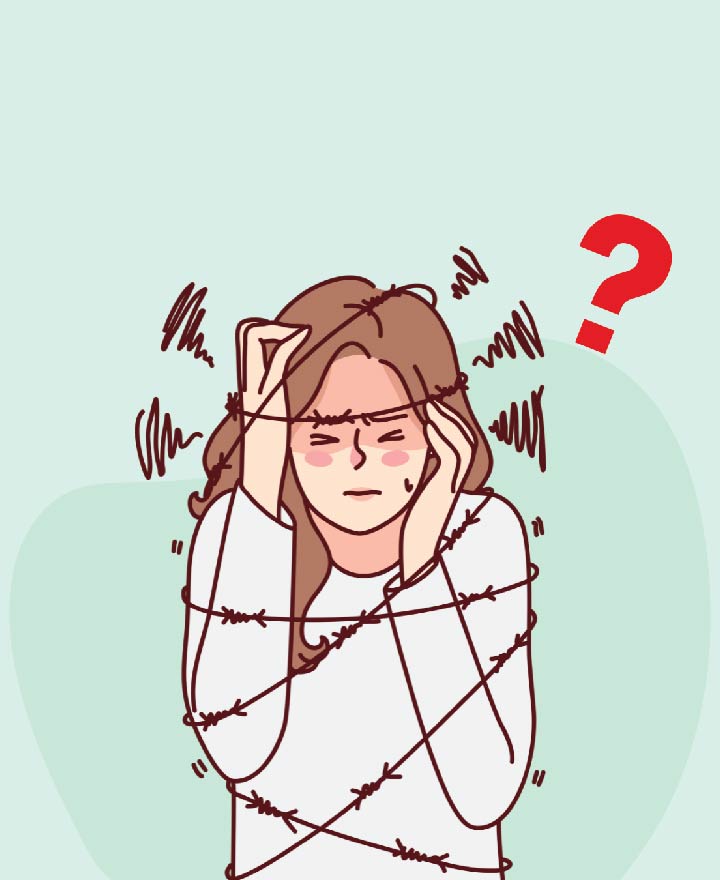

What is Psychosis
Psychosis is a mental health disorder where the person loses touch with reality. The primary symptoms of psychosis are delusions and hallucinations. Psychosis is actually more of a symptom than a disorder. It could be a symptom of a mental disorder, like severe depression, bipolar disorder, or schizophrenia. In this article, you will learn about the symptoms, causes, and risk factors of psychosis. You will also learn about how is psychosis diagnosed and treatment of psychosis.
Symptoms of Psychosis
The symptoms of psychosis may include:
• Delusions (false beliefs)
This can be of many types, such as persecutory (believing someone is out to get them), grandiose (thinking they have special powers or abilities), or referential (assuming that things happening around them are related to them in some way).
• Hallucinations
This can involve seeing, hearing, feeling, or smelling things that aren't actually there.
• Disorganised speech or thinking
This can cause individuals to speak incoherently or switch topics, making it difficult to follow their train of thought.
• Abnormal behaviour
This behaviour can manifest as agitation, catatonia, or other unusual movements/actions.
The symptoms of psychosis are as follows:
• A drop in school grades or work performances
• Trouble focusing
• Difficulty concentrating
• Paranoia
• Social withdrawal
• Lack of interest in personal grooming
• Trouble communicating
• Talking about unreal/non-existent things or people
• Frozen appearance or catatonia
• Lack of eye contact
• Disorganised behaviour
• Constant talking
• Switching topics
• Loss of train of thoughts
• Incoherent speech
Causes of Psychosis
The cause of psychosis varies. As mentioned earlier, psychosis is not a disease but a combination of symptoms. Depending on the symptoms the causes can vary. While genetics play a role for some, it could stem from an illness for others. Schizophrenia, bipolar disorder, and other dissociative disorders can be considered as causes of psychosis. Some known causes of psychosis are listed below.
• Genetics
• Childhood trauma
• Substance abuse
• Mental health conditions like schizophrenia & bipolar disorder
• Maternal infections
• Maternal stress
• Head injury
• Lack of sleep
• Certain medicines
• Sex hormones
Risk Factors for Developing Psychosis
Several aspects are considered risk factors for developing psychosis. Some risk factors for developing psychosis include a family history of the condition, drug use, trauma or stress, and a history of mental health issues. Other factors could be social isolation, sleep deprivation, and exposure to environmental toxins. Some common risk factors are as follows:
• Brain injury, including stroke or traumatic brain injury
• Family history of schizophrenia, other psychotic disorders, or mood disorders
• Dementia, such as Alzheimer’s disease
• Brain tumour or cyst
• Alcohol and drug misuse
• Certain prescription medications
• HIV and other infections
• Childhood brain trauma or infections
• Genetic mutations
How is Psychosis Diagnosed?
Psychosis is not a disease but often a symptom of a severe mental health condition. To diagnose psychosis, the doctor will do a detailed psychiatric evaluation. The doctor will try to understand genetics, family history, and social and religious contexts. He/she may also perform medical tests like CBC, thyroid function tests, etc. The doctor may also test for HIV and syphilis, as well as ascertain if there is any history of head injury, drug abuse, or brain tumour.
Treatment of Psychosis
Psychosis is treated using a combination of medication and therapy. Some of the treatment options are as follows:
• Antipsychotics
• Tranquilisers
• Cognitive behavioural therapy
The treatment of psychosis takes time and depends on the phases of psychosis. If a person is suffering from psychotic rage where there is a risk of self-harm, suicide, or harming others, the doctor may use rapid tranquilisation to help the patient fall asleep. Electroconvulsive therapy is also used in severe cases of psychosis, especially if a patient is suffering from psychotic rage.
Conclusion
Psychosis is a condition that causes a person to lose touch with reality and can be characterised by symptoms such as hallucinations and delusions. It can occur due to various reasons, such as underlying mental health conditions, infections, or traumatic experiences. Although experiencing a psychotic episode can be distressing, treatment options are available to help manage the symptoms effectively.
One of the important components of our overall wellness is also being financially secured. Healthcare emergencies can happen any time, but a good health insurance policy can protect you from such uncertain situations. To know more about Wellness and other health related tips, visit the Wellness Corner.
Source: mayoclinic, sheppardpratt, medicalnewstoday, healthline
Disclaimer: This blog provides general information and discussions about health and related subjects. The information and other content provided in this blog, website or in any linked materials are not intended and should not be considered, or used as a substitute for, medical advice, diagnosis or treatment. Kindly contact your Doctor before starting a new medicine or health regime.
Related Articles
Understanding Bipolar Type 2 Disorder
Illness Anxiety Disorder & Its Classification
Understanding Separation Anxiety Disorder
Panic Attack & Panic Disorder: Are these the same?
Types of Social Anxiety Disorder and Their Impact
Published on December 26, 2023














 Health Insurance
Health Insurance  Travel Insurance
Travel Insurance  Car Insurance
Car Insurance  Cyber Insurance
Cyber Insurance  Critical Illness Insurance
Critical Illness Insurance
 Pet Insurance
Pet Insurance
 Bike/Two Wheeler Insurance
Bike/Two Wheeler Insurance  Home Insurance
Home Insurance  Third Party Vehicle Ins.
Third Party Vehicle Ins.  Tractor Insurance
Tractor Insurance  Goods Carrying Vehicle Ins.
Goods Carrying Vehicle Ins.  Passenger Carrying Vehicle Ins.
Passenger Carrying Vehicle Ins.  Compulsory Personal Accident Insurance
Compulsory Personal Accident Insurance  Travel Insurance
Travel Insurance  Rural
Rural